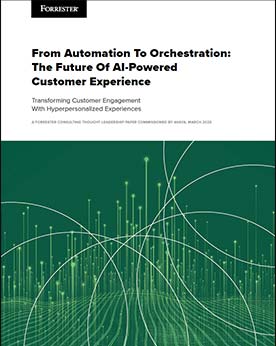AI Orchestration study by Avaya: The Game-Changer for Customer Experience in Contact Centers
In the fast-evolving world of customer experience (CX), artificial intelligence (AI) is no longer just an automation tool—it is an orchestrator of seamless, hyper-personalized interactions. Avaya latest study, From Automation to Orchestration: The Future of AI-Powered Customer Experience, conducted by Forrester Consulting, reveals that large global enterprises are shifting towards AI-driven engagement strategies. This transition is not just about improving efficiency; it is about creating meaningful customer relationships that drive loyalty and revenue growth.
The Rise of AI in CX: From Automation to Orchestration
According to the Avaya study, 52% of business decision-makers prioritize AI to enhance customer support efficiency. Additionally, 42% highlight reducing operational costs and improving satisfaction as equally important. However, AI in CX is evolving beyond simple automation. Organizations are now embracing AI orchestration—using AI to unify customer data, predict needs, and deliver real-time, personalized interactions.
Traditionally, AI in contact centers focused on automation—chatbots handling FAQs, virtual assistants routing calls, and predictive analytics streamlining workflows. While these innovations improved efficiency, they often lacked contextual understanding. AI orchestration, however, goes a step further. It integrates multiple AI tools, customer history, and real-time insights to craft interactions that feel intuitive and human-like.
For example, instead of a chatbot simply answering a question, AI orchestration enables it to recognize the customer’s past interactions, anticipate their next need, and proactively offer a solution—without requiring human intervention. This shift from automation to orchestration is what sets apart leading CX-focused companies.
Hyper-Personalization: The Core of AI-Orchestrated CX
Customers today expect more than just quick resolutions; they want brands to know them. Hyper-personalization—using AI to analyze past behaviors, preferences, and real-time context—helps companies deliver tailor-made experiences.
Imagine a frequent traveler calling an airline’s contact center. Instead of being routed through generic menus, AI-driven orchestration instantly identifies their loyalty status, recent bookings, and potential issues. The system then proactively offers relevant options—like upgrading their seat, notifying them about flight delays, or even arranging lounge access. Such real-time, personalized engagement builds customer trust and strengthens brand loyalty.
The study underscores this trend, with 45% of businesses planning to implement advanced AI orchestration capabilities within the next 12 months. Companies that embrace AI-driven personalization at every touchpoint will not only meet but exceed customer expectations.
The Challenges of AI Adoption in Contact Centers
Despite the undeniable benefits of AI in CX, businesses face challenges when integrating these technologies. The top concerns cited by survey respondents include:
- High cost of replacing existing technologies (37%) – Many companies operate legacy systems that require significant investment to upgrade or integrate with AI tools.
- Security and data privacy (35%) – AI relies on vast amounts of customer data, making compliance with regulations like GDPR and HIPAA critical.
- Phased AI adoption (76%) – Organizations recognize the need for gradual implementation to maintain service quality and avoid disruption.
- Business continuity (76%) – Ensuring AI integration does not interfere with ongoing operations is a priority.
- Alignment with corporate AI strategies (72%) – Businesses emphasize the importance of a cohesive AI strategy that integrates with other tools.
- Flexible AI integration (71%) – Organizations want the ability to incorporate multiple AI solutions without being locked into a single provider.
- AI compliance tools (59%) – There is growing demand for AI solutions that include built-in compliance mechanisms for data security and governance.
These concerns highlight the need for businesses to take a strategic, phased approach to AI adoption—one that balances innovation with risk management.
The Future of AI in Contact Centers: A Competitive Advantage
Despite implementation challenges, the study confirms that organizations continue to adopt AI in contact centers due to its competitive advantages. Businesses that leverage AI orchestration will gain the ability to:
- Deliver real-time, intelligent interactions – AI can analyze customer sentiment, purchase history, and engagement patterns to provide dynamic, context-aware responses.
- Reduce customer effort – By eliminating the need for customers to repeat information or navigate complex menus, AI-driven experiences feel effortless.
- Improve operational efficiency – AI can optimize call routing, automate repetitive tasks, and assist agents with real-time insights, reducing handling times and increasing first-contact resolution rates.
- Enhance employee productivity – AI not only benefits customers but also supports agents by providing real-time recommendations, automating post-call summaries, and reducing workload stress.
- Strengthen customer trust – Personalized interactions create emotional connections, making customers more likely to stay loyal to a brand.
Pete Lavache, CMO at Avaya, highlights the significance of this shift:
“Companies know exceptional customer experiences drive revenue. The major hurdle is being able to orchestrate those experiences using any AI tool they choose. At Avaya, we’re focused on giving customers the agility to make these decisions and pivots in real time so they can keep pace with change and forge valuable ongoing relationships.”

Preparing for the AI-Orchestrated Future of CX
The speed at which AI is transforming customer interactions depends on businesses’ ability to integrate, scale, and optimize these technologies. Organizations that invest in flexible, scalable platforms will be best positioned to evolve alongside AI advancements while balancing customer satisfaction and profitability.
To gain deeper insights into AI-powered CX, industry experts will share key findings from the study in Avaya upcoming webinar, The AI-Orchestrated Contact Center, on April 29 or 30. This event will explore:
- How AI is reshaping customer interactions
- Strategies for overcoming AI adoption barriers
- Best practices for implementing AI orchestration
- Real-world case studies of AI-driven CX transformation
As AI continues to redefine the contact center landscape, companies that embrace AI orchestration will lead the way in delivering superior customer experiences. The question is no longer whether businesses should adopt AI—but how quickly they can integrate and optimize it to stay ahead in an increasingly competitive market.

